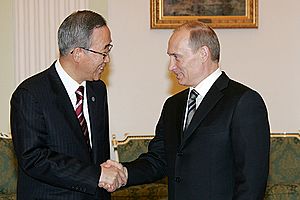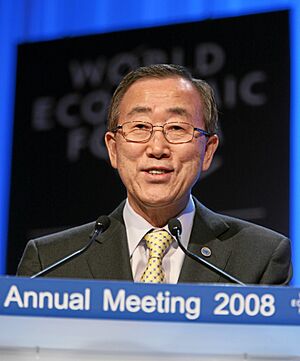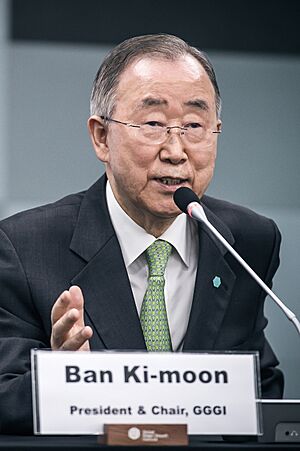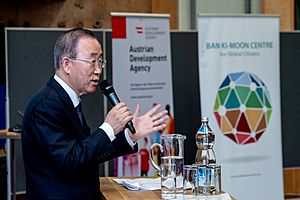Ban Ki-moon facts for kids
Quick facts for kids
Ban Ki-moon
|
|
|---|---|
|
반기문
|
|
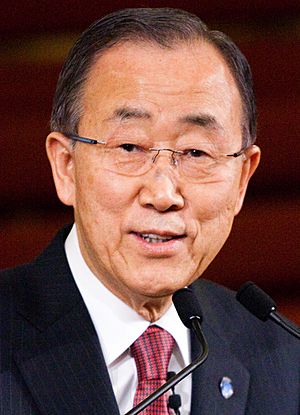
Ban in 2016
|
|
| 8th Secretary-General of the United Nations | |
| In office 1 January 2007 – 31 December 2016 |
|
| Deputy |
|
| Preceded by | Kofi Annan |
| Succeeded by | António Guterres |
| Minister of Foreign Affairs and Trade | |
| In office 17 January 2004 – 1 December 2006 |
|
| President | Roh Moo-hyun |
| Preceded by | Yoon Young-kwan |
| Succeeded by | Song Min-soon |
| Personal details | |
| Born | 13 June 1944 Insei, Chūseihoku Province, Korea, Empire of Japan |
| Political party | Independent |
| Spouse |
Yoo Soon-taek
(m. 1971) |
| Children | 3 |
| Education | |
| Signature |  |
| Korean name | |
| Hangul |
반기문
|
| Hanja |
潘基文
|
| RR | Ban Gimun |
| MR | Pan Kimun |
| IPA | panɡimun |
Ban Ki-moon (born 13 June 1944) is a South Korean politician and diplomat. He served as the eighth Secretary-General of the United Nations from 2007 to 2016. Before this important role, Ban was South Korea's Minister of Foreign Affairs and Trade from 2004 to 2006.
Ban was not initially expected to become the UN Secretary-General. However, he worked hard to gain support. As foreign minister, he visited many countries on the United Nations Security Council. This helped him become a top candidate for the job. On 13 October 2006, the United Nations General Assembly chose him as the eighth Secretary-General. He took over from Kofi Annan on 1 January 2007.
As Secretary-General, Ban worked on big changes for peacekeeping and how the UN hired people. He spoke strongly about global warming and the Darfur conflict. He helped convince the Sudanese president to allow peacekeeping troops into Sudan. In 2013, Forbes magazine named him the 32nd most powerful person in the world. This was the highest ranking for any South Korean. In 2016, Foreign Policy magazine called him one of the Top 100 Global Thinkers. This was for his work in getting the Paris Agreement on climate change approved quickly.
António Guterres became Ban Ki-moon's successor on 1 January 2017. After leaving the UN, Ban was considered a possible candidate for the 2017 South Korean presidential election. However, he announced on 1 February 2017 that he would not run. In September 2017, Ban was chosen to lead the International Olympic Committee's Ethics Commission. He also helped start the Ban Ki-moon Centre for Global Citizens, a non-profit group. He is currently a professor at Yonsei University.
In 2018, Ban was elected president and chair of the Global Green Growth Institute (GGGI). This organization helps developing countries grow their economies in a way that is good for the environment and people. Since he joined, GGGI has grown from 27 to 48 member countries. In 2018, he also became co-chair of the Global Commission on Adaptation, working with Bill Gates. This group worked to speed up actions against climate change. Ban now co-chairs the Global Center on Adaptation, continuing this important work. He has also supported the Green New Deal in the United States.
Early Life and Education
Ban Ki-moon was born on 13 June 1944. He grew up in a small farming village in what is now North Chungcheong Province, South Korea. His family later moved to the nearby town of Chungju. During the Korean War, his family had to flee to the mountains for safety. After the war, they returned to Chungju. Ban has shared that he met American soldiers during this time.
In high school at Chungju High School, Ban was a top student, especially in English. In 1962, he won an essay contest by the Red Cross. This prize allowed him to visit the United States. He stayed with a host family in San Francisco for several months. During this trip, Ban met U.S. President John F. Kennedy. When asked what he wanted to be, Ban said, "I want to become a diplomat."
Ban graduated from Seoul National University in 1970 with a degree in international relations. He then earned a master's degree in public administration from Harvard University in 1985. Besides his native Korean, Ban also speaks English and French.
Diplomatic Career
After college, Ban scored highest on Korea's foreign service exam. He joined the Ministry of Foreign Affairs in May 1970. He steadily moved up in his career.
His first job overseas was in New Delhi, India, as a vice consul. He impressed his bosses with his skills. In 1974, he worked at the United Nations for the first time. He was the First Secretary of South Korea's mission there. South Korea became a full UN member in 1991. In 1980, Ban became director of the UN's International Organizations and Treaties Bureau in Seoul. He also worked twice at the South Korean embassy in Washington, D. C.. From 1993 to 1994, he was Korea's deputy ambassador to the United States. He became deputy minister for policy planning in 1995 and a national security advisor in 1996.
In 1998, Ban became ambassador to Austria and Slovenia. A year later, he was chosen to chair the Preparatory Commission for the Comprehensive Nuclear-Test-Ban Treaty Organization (CTBTO PrepCom). In 2001, he faced a setback when he was removed from a position by President Kim Dae-jung after a public statement. However, he was later chosen to be chief of staff to the president of the United Nations General Assembly during its 56th Session. In 2003, President Roh Moo-hyun picked Ban as a foreign policy advisor.
Foreign Minister of South Korea
In 2004, Ban became South Korea's foreign minister. Early in his term, he dealt with major events. These included the kidnapping and killing of a South Korean in Iraq and many Koreans dying in the 2004 Indian Ocean tsunami. Ban's popularity grew when talks began with North Korea. He played a key role in efforts to resolve the North Korean nuclear issue in 2005.
As foreign minister, Ban managed South Korea's trade and aid policies. This work allowed him to sign trade deals and give foreign aid. These actions helped him gain support for his later bid to become UN Secretary-General.
United Nations Career
Campaign for Secretary-General: 2007
In February 2006, Ban announced he wanted to become the next UN Secretary-General. He was the first South Korean to seek this role. At first, many did not see him as a strong candidate.
Over the next eight months, Ban visited all 15 countries on the Security Council. He topped all four unofficial polls held by the United Nations Security Council. To be confirmed, Ban needed support from the diplomatic community. He also had to avoid a veto from any of the five permanent members: China, France, Russia, the United Kingdom, and the United States.
Ban was well-liked in Washington because he supported sending South Korean troops to Iraq. He also had the support of the Bush administration. However, Ban also disagreed with some U.S. views. He supported the International Criminal Court and preferred a peaceful approach to North Korea. He said he wanted to visit North Korea and meet with Kim Jong Il.
Ban worked to gain France's approval. He speaks French, one of the UN's working languages, but admitted he needed to improve. He promised French diplomats he would continue studying it. As the election got closer, some criticized South Korea's campaign for Ban. They suggested that South Korea used its economic power to gain votes. Ban denied these claims, saying they were "groundless."
In the final unofficial poll on 2 October, Ban received 14 "yes" votes and one "no opinion" from the Security Council members. The "no opinion" came from Japan, which was against a Korean becoming Secretary-General. However, Japan later voted for Ban to avoid conflict. Ban was the only candidate who did not receive a veto from a permanent member. After the vote, Shashi Tharoor, who came in second, withdrew his candidacy. China's UN representative said it was clear Ban would be recommended.
On 9 October, the Security Council officially chose Ban as its nominee. All 15 members supported him. On 13 October, the 192-member General Assembly formally approved Ban as Secretary-General.
First Term as Secretary-General
When Ban became Secretary-General, he faced many global challenges. These included nuclear issues in Iran and North Korea, conflicts in Darfur and the Middle East, climate change, and terrorism. On 23 January 2007, Ban officially took office.
Early in his term, Ban appointed key members of his team. He chose Asha-Rose Migiro of Tanzania as his Deputy Secretary-General. He also appointed Alicia Bárcena Ibarra of Mexico to a top management role. Ban appointed many women to senior positions, fulfilling a promise he made during his campaign.
Reform Agenda
In his first month, Ban suggested two big changes: splitting the UN peacekeeping operation into two departments and combining political affairs and disarmament. These ideas faced some resistance. After talking with UN ambassadors, Ban changed his plans. He dropped the idea of combining political affairs and disarmament. However, he moved forward with other reforms. These included making all UN jobs five-year appointments and requiring public financial reports. These changes were popular outside the New York office. His plan to split the peacekeeping operation was approved in March 2007.
Key Issues
The UN Secretary-General can influence many global issues. Ban focused on several important topics.
Global Warming
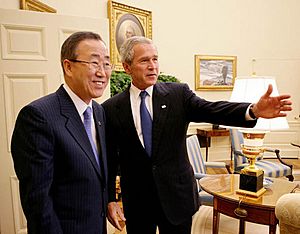
Ban quickly made global warming a top priority. In January 2007, he urged U.S. President George W. Bush to reduce greenhouse gas emissions. In a speech on 1 March 2007, Ban said that climate change was as dangerous as the threat of nuclear war. In September 2014, Ban joined the People's Climate March in New York City. He also gathered world leaders for the UN Climate Summit to prepare for the United Nations Climate Change Conference in Paris in 2015.
Middle East
On 22 March 2007, Ban was in Baghdad, Iraq, when a mortar attack happened near him. No one was hurt, but it showed the dangers of the region. Ban said he still hoped the UN could do more for Iraq.
During his trip, Ban visited Egypt, Israel, the West Bank, Jordan, Lebanon, and Saudi Arabia. He met with Omar Hassan al-Bashir, the Sudanese president, to discuss peacekeepers in Darfur. Ban criticized Israel in March 2008 for planning to build new homes in a West Bank settlement. In January 2009, he called for an end to fighting in the Gaza Strip, criticizing both Israel and Hamas.
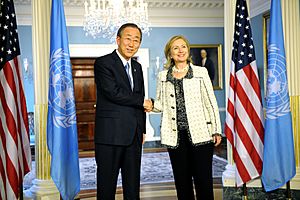
The Libyan Civil War began in 2011. Ban focused on finding peaceful solutions. He often spoke against military action, believing diplomacy was better. However, he agreed that if Muammar Gaddafi did not stop fighting, military action would be needed to protect human rights.
Darfur
Ban made Darfur a top humanitarian concern. He met with Sudanese President Omar Hassan al-Bashir multiple times. He convinced Sudan to allow UN peacekeepers into the Darfur region. On 31 July 2007, the United Nations Security Council approved sending 26,000 UN peacekeepers. This was a big step in addressing the Darfur conflict.
Myanmar
In May 2008, Ban Ki-moon went to Myanmar after Cyclone Nargis caused widespread damage. He helped organize a conference to get more donations for the country. He also toured the damaged areas and secured an agreement for the Yangon International Airport to be used for aid delivery.
Campaign for Second Term as Secretary-General: 2011
On 6 June 2011, Ban Ki-moon officially announced he would seek a second term as Secretary-General. His first term was set to end on 31 December 2011. All five permanent Security Council members supported him, and he had no rivals for the position.
Second Term as Secretary-General
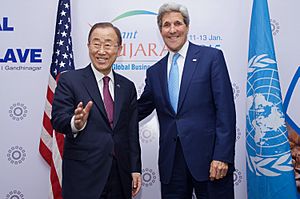
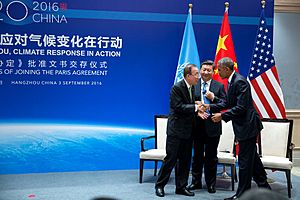
On 17 June 2011, the Security Council recommended him unanimously. On 21 June, the United Nations General Assembly confirmed his nomination. His second five-year term began on 1 January 2012 and ended on 31 December 2016.
Cabinet
For his second term, Ban appointed Swedish diplomat Jan Eliasson as his new deputy secretary-general. These appointments were part of his plan to refresh his leadership team.
Key Issues
During his second term, Ban focused on peace and equality in the Middle East and on human rights issues.
Middle East
The events of the Arab Spring continued to be a major focus for Ban. In 2012, he spoke about "intolerance" in the Arab world. He expressed concern about the Israeli–Palestinian conflict, especially the condition of Palestinian prisoners and movement limits in the Gaza Strip. In August 2012, Ban criticized Iranian leaders for statements about Israel. In 2013, he admitted that the UN had a "biased attitude" towards Israel, calling it "an unfortunate situation." He later clarified his remarks. In 2016, Ban stated that "it is human nature to react to occupation," which was criticized by Israeli Prime Minister Benjamin Netanyahu.
Ban also criticized the Saudi Arabian-led intervention in Yemen for harming children. In June 2016, he removed the Saudi-led coalition from a list of child rights violators. He later said this was due to threats from Saudi Arabia to cut aid to Palestinians and other UN programs.
Ukraine
In June 2016, Ban said Russia had a "critical role to play" in global issues, including ending conflicts in Ukraine and Syria. Ukraine's UN envoy criticized these comments, saying Russia was the main aggressor in the conflict.
LGBT Rights
On 7 March 2012, Ban gave a speech urging the United Nations Human Rights Council to fight homophobia and promote LGBT rights. Some delegates walked out in protest. Ban has said that it is wrong for countries to criminalize people for loving someone of the same sex. He has also stated that religion, culture, or tradition cannot justify denying basic rights.
Syrian Conflict
Ban played a role in organizing and leading the Geneva II Conference on Syria, which aimed to find a peaceful solution to the Syrian civil war.
Humanitarian Action
On 25 January 2012, Ban announced the first-ever summit on humanitarian aid. This event, called the World Humanitarian Summit, took place in Istanbul, Turkey, in May 2016. Ban released a report called 'One Humanity, Shared Responsibility' to prepare for the summit. This report outlined ways to improve humanitarian action, including preventing conflicts and finding new ways to fund aid.
Criticism as UN Secretary-General
Some UN employees and delegates criticized Ban for supposedly favoring South Korean nationals in key positions. Ban and his team said these claims were false and that the appointed South Koreans were highly qualified. Others defended Ban, saying the complaints were due to envy.
Inga-Britt Ahlenius, a former UN Under Secretary General, criticized Ban in 2010. She claimed he tried to weaken the independence of the UN's oversight office. Ban's staff denied this, saying he followed proper hiring rules.
American diplomat James Wasserstrom claimed Ban tried to limit the power of the UN dispute tribunal. Ban also faced criticism for not providing documents in some internal cases. In 2013, Ban was accused of undermining the rights of the UN staff union.
Ban was named in a lawsuit regarding the 2010–13 Haiti cholera outbreak, which was linked to UN peacekeepers. Ban stated that the UN's legal immunity should be upheld, but that the UN had a moral duty to help Haiti. The lawsuit was dismissed, upholding UN immunity.
Some critics, like The Economist magazine, called Ban "dullest" and "among the worst" secretaries-general. However, others defended him. Japanese diplomat Kiyotaka Akasaka said Ban's quiet presence was like a wise man in Eastern philosophy. South African lawyer Nicholas Haysom said the media often ignored Ban's strong comments.
Post-U.N. Work
In 2017, Ban and Heinz Fischer, a former Austrian president, co-founded the Ban Ki-moon Centre for Global Citizens in Vienna, Austria. This non-profit group helps young people and women, focusing on the UN's Sustainable Development Goals.
In June 2017, Ban joined The Elders, a human rights group started by Nelson Mandela. In 2018, he became a deputy chair of the group. In 2017, he also joined French President Emmanuel Macron in calling for a Global Pact for the Environment.
In early 2018, Ban was chosen to lead the Global Green Growth Institute (GGGI). He has been re-elected several times and will serve as president and chair of GGGI until December 31, 2025. Ban also supports the U.S. Democrats' Green New Deal. In 2020, he became the Official Ambassador for the GEMS World Academy Model United Nations.
Personal Life
Family
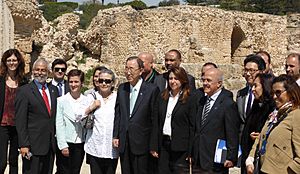
Ban Ki-moon met Yoo Soon-taek in 1962 when they were in high school. They married in 1971. They have three adult children: two daughters and a son. His elder daughter, Seon-yong, works for the Korea Foundation in Seoul. His son, Woo-hyun, works for an investment firm in New York. His younger daughter, Hyun-hee, is a field officer for UNICEF in Nairobi.
After he was elected Secretary-General, Ban became a hero in his hometown. Thousands of people gathered to celebrate. Ban himself has not publicly shared his religious beliefs. His mother is Buddhist.
Personality and Public Image
During his time at the South Korean Foreign Ministry, Ban's nickname was jusa, meaning "the administrative clerk." This name showed both his attention to detail and his quiet nature. The South Korean press called him "the slippery eel" because he was good at avoiding direct answers. His colleagues praised his calm, "Confucian approach" and his "easy smile." After becoming UN Secretary-General, some described him as an "invisible man" or "powerless observer" due to his quiet leadership style.
Honours and Awards
National
 South Korea: Blue Stripes or 1st Class of the Order of Service Merit (1975, 1986, 2006).
South Korea: Blue Stripes or 1st Class of the Order of Service Merit (1975, 1986, 2006).
Foreign
 Austria: Grand Decoration of Honour in Gold with Star of the Decoration of Honour for Services to the Republic of Austria (2001).
Austria: Grand Decoration of Honour in Gold with Star of the Decoration of Honour for Services to the Republic of Austria (2001). Brazil: Grand Cross of the Order of Rio Branco.
Brazil: Grand Cross of the Order of Rio Branco. Peru: Grand Cross of the Order of the Sun (2006).
Peru: Grand Cross of the Order of the Sun (2006). Algeria: National Order of Merit of Algeria.
Algeria: National Order of Merit of Algeria. El Salvador: Grand Cross with Silver Star of the Order of Jose Matias Delgado.
El Salvador: Grand Cross with Silver Star of the Order of Jose Matias Delgado. Philippines: Grand Cross of the Order of Sikatuna, Rank of Raja (30 October 2008).
Philippines: Grand Cross of the Order of Sikatuna, Rank of Raja (30 October 2008). Kazakhstan: Order of Friendship, 1st class (2010).
Kazakhstan: Order of Friendship, 1st class (2010). Tajikistan: Order of Ismoili Samoni (2010).
Tajikistan: Order of Ismoili Samoni (2010). Burkina Faso: Grand Cross of the National Order of Burkina Faso (2008).
Burkina Faso: Grand Cross of the National Order of Burkina Faso (2008). Ivory Coast: Grand Officer of the National Order of Ivory Coast (2008).
Ivory Coast: Grand Officer of the National Order of Ivory Coast (2008). Monaco: Grand Cross of the Order of Saint-Charles (2013).
Monaco: Grand Cross of the Order of Saint-Charles (2013). San Marino: Order of Saint Agatha (2013).
San Marino: Order of Saint Agatha (2013). Uruguay: Medal of the Oriental Republic of Uruguay (2011).
Uruguay: Medal of the Oriental Republic of Uruguay (2011). Netherlands: Grand Cross of the Order of the Netherlands Lion (19 April 2016).
Netherlands: Grand Cross of the Order of the Netherlands Lion (19 April 2016). Russia: Order of Friendship (8 June 2016).
Russia: Order of Friendship (8 June 2016). Argentina: Grand Cross of the Order of the Liberator General San Martín (2016).
Argentina: Grand Cross of the Order of the Liberator General San Martín (2016). Portugal: Grand Cross of the Order of Liberty (13 May 2016).
Portugal: Grand Cross of the Order of Liberty (13 May 2016).
Foreign Awards
 Turkmenistan: Jubilee medal "25th anniversary of the neutrality of Turkmenistan" (2020).
Turkmenistan: Jubilee medal "25th anniversary of the neutrality of Turkmenistan" (2020). Austria: Grand Golden Order of the City of Vienna (2013).
Austria: Grand Golden Order of the City of Vienna (2013). Samoa: High Matai title conferred by Samoa as Prince Tapua Ban Ki-Moon of Suipapa Saleapaga (September 2014).
Samoa: High Matai title conferred by Samoa as Prince Tapua Ban Ki-Moon of Suipapa Saleapaga (September 2014).- Ban Ki-moon was an Olympic Torch carrier for the 2016 Summer Olympics.
- He was also an Olympic Torch and Flag carrier for the 2012 Summer Olympics opening ceremony.
- He received the Arctic Circle Prize in 2016 for his work on climate diplomacy, especially for the Paris Agreement.
- He was given the James A. Van Fleet Award by the Korea Society for promoting friendship between the U.S. and South Korea.
- He accepted the 2014 Tipperary International Peace Award in Ireland in May 2015.
- Commemorative Medal of Freedom Heroes of the Republic of Hungary.
Honorary Degrees
- Honorary Doctor of Public Service degree from University of Maryland, College Park (2016).
- Honorary Doctor of Humane Letters degree from Loyola Marymount University (2016).
- Honorary Doctor of Laws degree of The University of Auckland (2014).
- Honorary Doctorate in Human Letters from Fairleigh Dickinson University (2008).
- Honorary doctorate from Seoul National University (2008).
- Doctor Honoris Causa from the National University of San Marcos, Peru (2011).
- Doctor of Laws Degree Honoris Causa from the College of Law at the University of the Philippines Diliman (2008).
- Honorary Doctor by the National University of Mongolia (2009).
- "Doctors of Letters" by Jamia Millia Islamia in New Delhi.
- Honorary doctorates in law from the University of Malta (2009) and the University of Washington (2009).
- Honorary doctorate of public service from University of Denver (2013).
- Honorary doctorate from Georgetown University (2015).
- Honorary doctorate from Katholieke Universiteit Leuven (2015).
- Doctor honoris causa from Comenius University (2015).
- Degree of Doctor of Civil Law Honoris Causa from University of Mauritius (2016).
- Honorary Doctor of Laws from Columbia University (2016).
- Honorary Degree from Marymount Manhattan College (2016).
- Doctor honoris causa from Panthéon-Sorbonne University (2016).
- Doctor of Law (honoris causa) from the University of Cambridge (2016).
- Honorary doctorate from the University of Groningen (2018).
- Honorary doctorate in Global Peace and Sustainable Development from Universiti Kebangsaan Malaysia (2019).
- Honorary doctorate in recognition of work in pursuing peace, promoting human rights, and advancing UN Sustainable Development from Tampere University (2022).
Books
- Resolved: Uniting Nations in a Divided World, New York: Columbia University Press, 2021.
See also
 In Spanish: Ban Ki-moon para niños
In Spanish: Ban Ki-moon para niños
- List of trips by Ban Ki-moon
 | William L. Dawson |
 | W. E. B. Du Bois |
 | Harry Belafonte |


